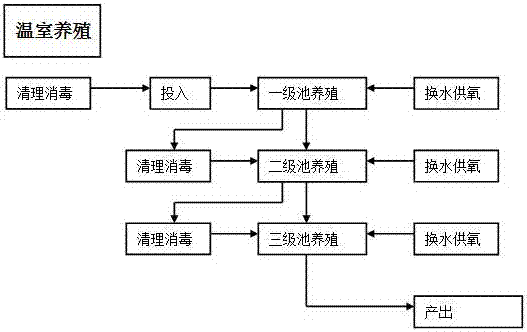Highland industrialization grading breeding method for penaeus vannamei boone
A white prawn, industrialized technology, applied in fish farming, climate change adaptation, application, etc., can solve the problems of breeding disease risk, occupying a large breeding site, etc., to reduce the risk of disease, solve the problem of insufficient oxygen supply, and high infrared efficiency Effect
- Summary
- Abstract
- Description
- Claims
- Application Information
AI Technical Summary
Problems solved by technology
Method used
Image
Examples
Embodiment 1
[0020] Embodiment 1: see figure 1 , the method for industrialized graded culture of Penaeus vannamei in the plateau of the present invention, in a 26°C greenhouse, uses the mode of graded series culture, puts the different growth periods of Penaeus vannamei into corresponding graded culture ponds for cultivation; Shrimp species are cultured in the pond for 20 days. After completion, they are transferred to the secondary pond for the second batch of primary ponds; the primary pond has the smallest volume and is used for the initial stage of cultivation. As the shrimp grows up, the cultivation environment of the primary pond changes relatively. It is too narrow to meet the conditions required for the growth of shrimp, so it is sent to the secondary pond; the emptied primary pond can be put into the second batch of initial shrimp seedlings for recycling after cleaning and disinfection. The secondary ponds are cultured for 40 days. After the completion, they are transferred to the...
Embodiment 2
[0028] Example 2: see figure 1 , the method for industrialized graded culture of Penaeus vannamei plateau in the present invention, in a greenhouse at 27°C, uses the mode of graded series culture, puts the different growth periods of Penaeus vannamei into corresponding graded culture ponds for cultivation; Shrimp species are cultured in the pond for 25 days. After completion, they are transferred to the secondary pond for the second batch of primary ponds; the primary pond has the smallest volume and is used for the initial stage of cultivation. As the shrimp grows up, the cultivation environment of the primary pond changes relatively. It is too narrow to meet the conditions required for the growth of shrimp, so it is sent to the secondary pond; the emptied primary pond can be put into the second batch of initial shrimp seedlings for recycling after cleaning and disinfection. The secondary pond is cultured for 30 days. After completion, it is transferred to the tertiary pond f...
Embodiment 3
[0036] Embodiment 3: see figure 1 , the method for industrialized graded culture of Penaeus vannamei in the plateau of the present invention, in a 30° C. greenhouse, uses the mode of graded series culture, and puts the different growth periods of Penaeus vannamei into corresponding graded culture ponds for cultivation; Shrimp species are cultured in the pond for 30 days. After completion, they are transferred to the secondary pond for the second batch of primary ponds; the primary pond has the smallest volume and is used for the initial stage of cultivation. As the shrimp grows up, the cultivation environment of the primary pond changes relatively. It is too narrow to meet the conditions required for the growth of shrimp, so it is sent to the secondary pond; the emptied primary pond can be put into the second batch of initial shrimp seedlings for recycling after cleaning and disinfection. The secondary pond is cultured for 20 days. After completion, it is transferred to the te...
PUM
 Login to View More
Login to View More Abstract
Description
Claims
Application Information
 Login to View More
Login to View More - R&D
- Intellectual Property
- Life Sciences
- Materials
- Tech Scout
- Unparalleled Data Quality
- Higher Quality Content
- 60% Fewer Hallucinations
Browse by: Latest US Patents, China's latest patents, Technical Efficacy Thesaurus, Application Domain, Technology Topic, Popular Technical Reports.
© 2025 PatSnap. All rights reserved.Legal|Privacy policy|Modern Slavery Act Transparency Statement|Sitemap|About US| Contact US: help@patsnap.com



